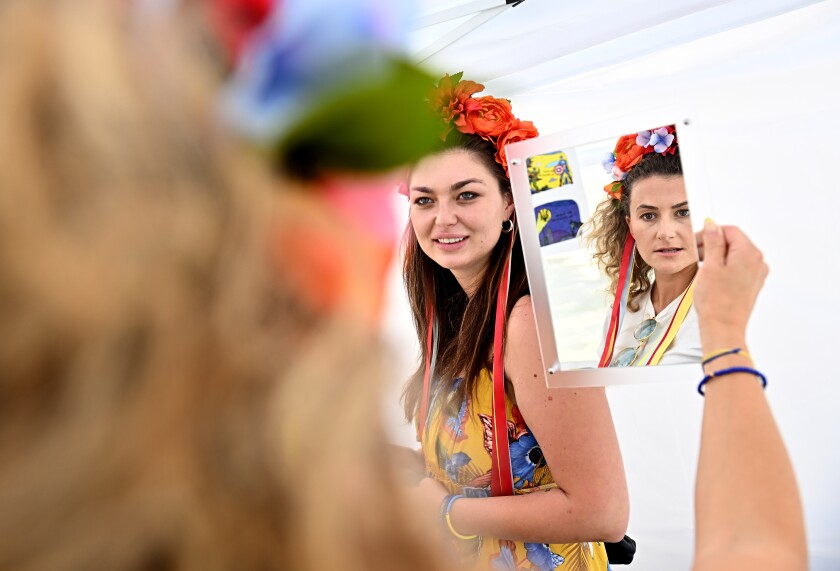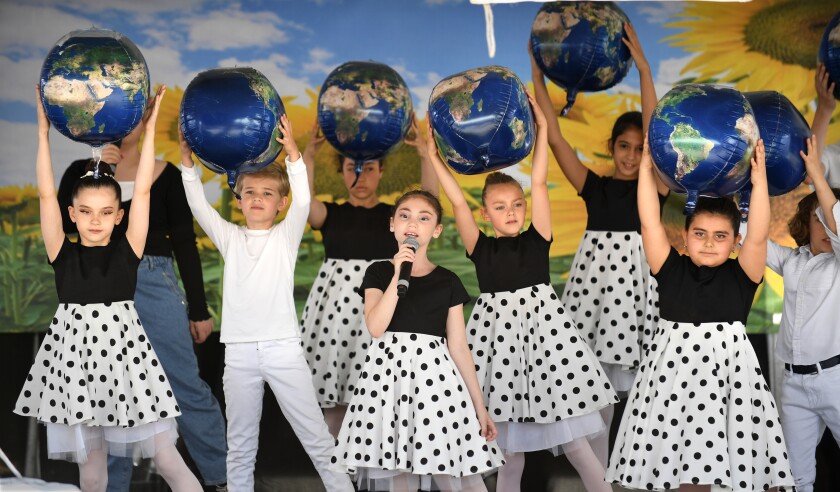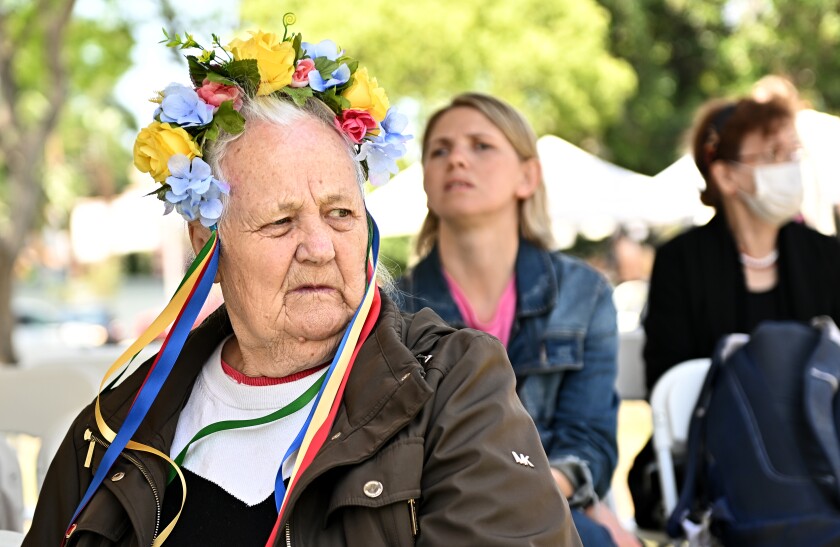As it has for more than two decades, West Hollywood had planned to put on a festival Sunday to celebrate Russian art and culture in honor of one of the city’s largest immigrant groups.
But this winter, after Russia invaded Ukraine, initiating a war that has killed thousands of people and created more than 6 million refugees, mention of “Russia” and “festival” in the same breath turned taboo.
City officials instead recast this year’s event as a fundraiser for Ukrainian refugees, pairing free activities for children (face painting, magicians, carnival games) with a silent auction and exhibit booths for humanitarian aid groups to collect donations.

Dasha Orlova, left, tries on a flower crown, a traditional Ukrainian headpiece, as Angelica Kotliar assists at a fundraiser for Ukrainian refugees in West Hollywood.
(Wally Skalij / Los Angeles Times)
“The point of all of this is for us to help those who are in need right now,” said Eugene Maysky, who came to Southern California from St. Petersburg seven years ago and now chairs West Hollywood’s Russian Advisory Board.
West Hollywood has long laid claim to having the largest concentration of Russian-speaking residents outside of New York, with the city’s east end a hub of emigres from the former Soviet Union, including Latvia, Georgia, Russian Federation, Belarus and Ukraine.
“There’s no rhyme or reason or any point to do this, because we all have relatives in both countries,” Maysky said of the ongoing war. “For us, it’s like one hand trying to kill another hand.”
Under the sun at Plummer Park, guests munched on pelmeni dumplings and Lithuanian ice cream at tables adorned in blue and yellow, in homage to Ukraine’s flag. Images of blooming sunflowers — Ukraine’s national flower — decorated the stage. Some attendees wore sunflower crowns, draped Ukrainian flags over their shoulders and struck notes of pain, solidarity, defiance and a touch of humor with their T-shirts. One read: “My wife is Ukrainian. Nothing scares me.”
Working among the booths lining the park was Julia Stadnik, a vice president at the shipping company Meest, the Ukrainian word for bridge. Since the war broke out, Stadnik said she and her family, who run a Glendale outpost of Meest, leveraged their decades of logistics experience and networks in Poland and Germany to help ship more than 100,000 tons of humanitarian aid — clothes, food and “anything for the army.”

The Matryoshka Kids perform at a fundraiser for Ukrainian refugees in West Hollywood.
(Wally Skalij / Los Angeles Times)
“It’s stressful,” said Stadnik, who was born in L.A. but whose parents hail from Lviv in western Ukraine. Many relatives are still in Ukraine, albeit on the relatively calmer west side. “But a cousin is getting trained for the army and prepared,” Stadnik said. “They are all worried.”
On Sunday, Stadnik was letting passersby know they could purchase care packages of food, even flowers, to deliver to loved ones in Ukraine, and that the public could give money directly to the company to fund ongoing aid shipments.
“Humanitarian aid is still getting brought,” she explained, referring to donations of clothing and other goods. “But the funding to get it overseas is the difficult part.”
At another booth, volunteers were selling dozens of vyshyvanka, a traditional embroidered shirt. A Reseda physician, Dr. Alex Fridman, had purchased the shirts directly from Ukraine, and all the proceeds from Sunday’s sales were paying for refugee children to attend Camp Gesher, a Jewish summer camp in Malibu. The silent auction’s proceeds were also supporting attendance at the camp, said Dina Gontar, the longtime event producer.
The festival was a “huge” change in tenor from past years, Gontar acknowledged, and she was uncertain about what next year would bring: “Hopefully the war will be over, and we’ll live in a peaceful time.”
For Victoria Pindrik, the fundraiser offered a chance to remind the community about the need for help. Pindrik founded the nonprofit Save Ukraine Relief Fund on the second day of the war, and the group has since completed 1,000-plus emergency evacuations while also assisting refugees at the U.S.-Mexico border.

Some attendees wore sunflower crowns, draped Ukrainian flags over their shoulders and struck notes of pain, solidarity, defiance and a touch of humor with their T-shirts. One read: “My wife is Ukrainian. Nothing scares me.”
(Wally Skalij / Los Angeles Times)
Known as SURF — an homage to its base in California — the organization has become a hub for refugees in need of food, aid, jobs and help with paperwork. Though Pindrik observed a surge of support in the early weeks of Russia’s invasion, as time passes she sees diminished interest.
“It’s become a part of daily life — ‘Oh, another rocket,’ ” she said. “But for those with friends and family on the front lines, they don’t know if they’ll hear their voice tomorrow.”
Sunday’s festival and fundraiser, she said, was to remind people, “We are here and available.”
Maysky, of the Russian Advisory Board, took the metaphor of family further, hoping that in the face of an “absurd” war, the fundraiser could foster more unity among Russian-speaking people.
“We’ve always been siblings — brothers and sisters,” he said. “It’s not like everything’s always perfect, but like siblings, in the end, we stand up for each other because we love each other.”

